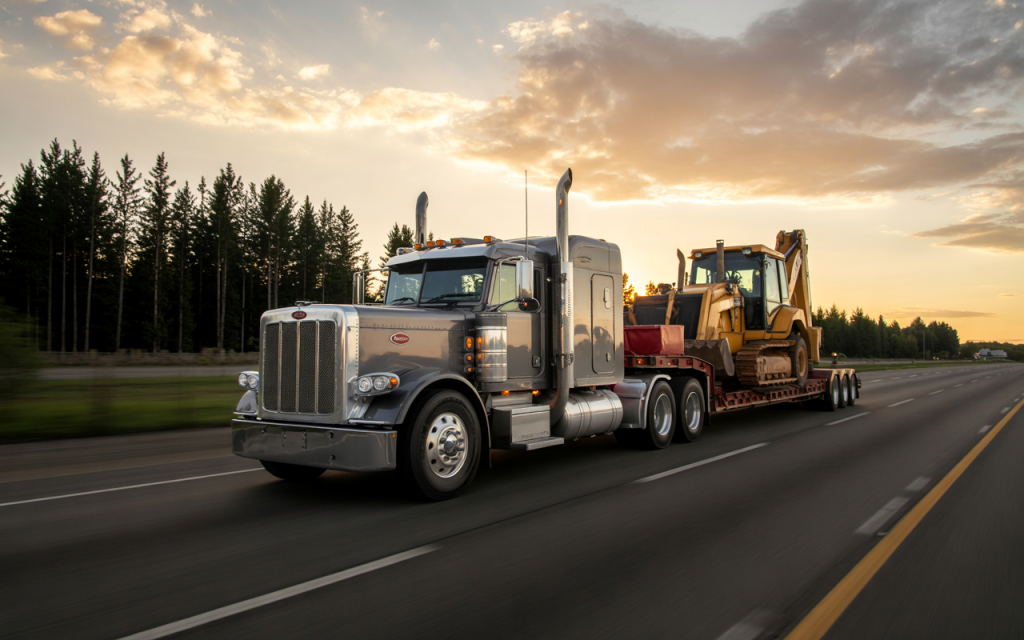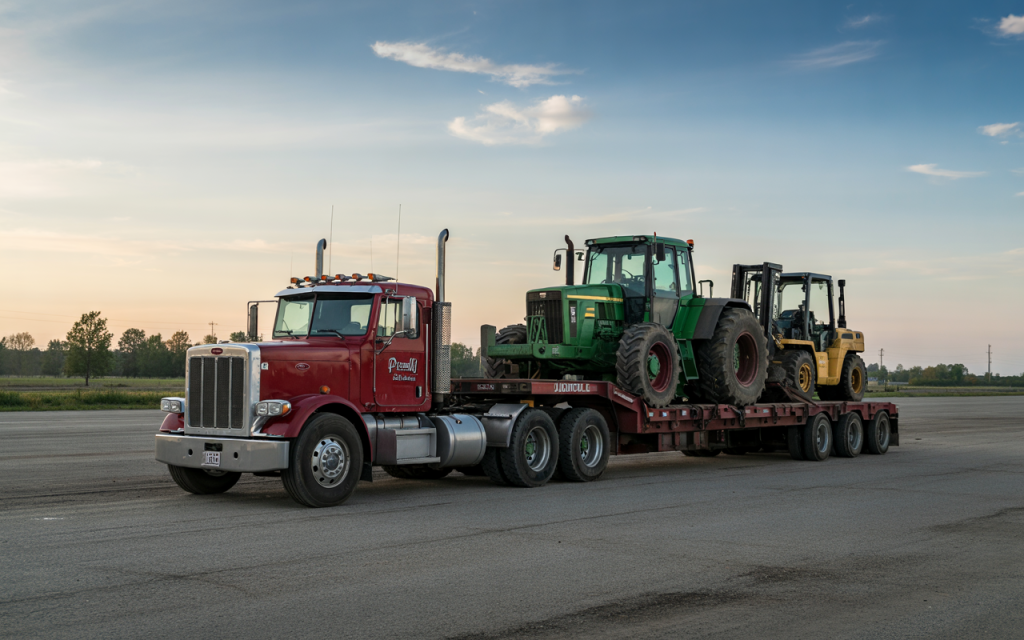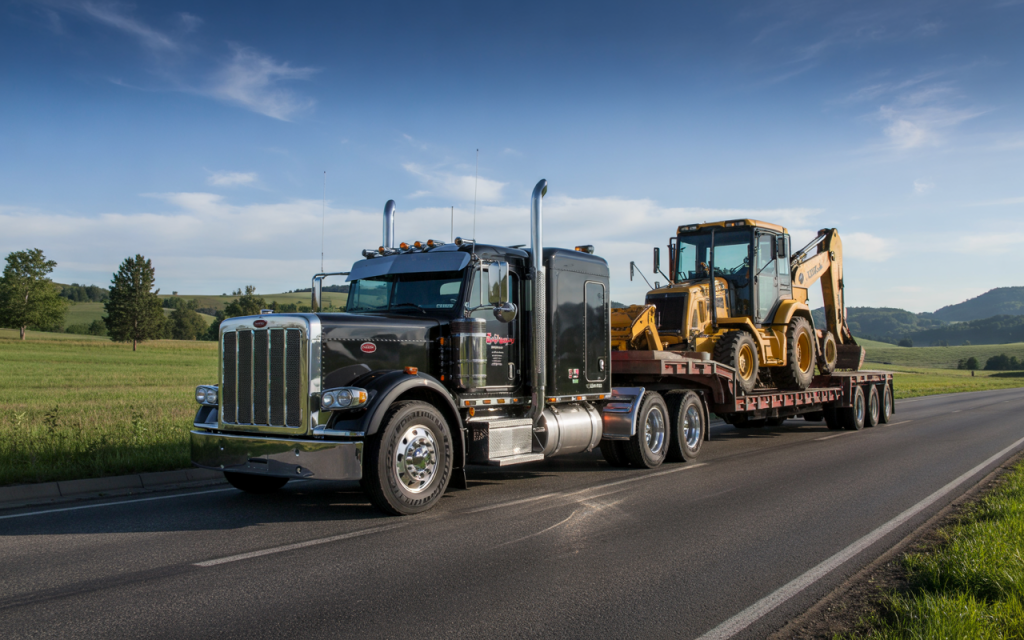How We Plan Heavy Haul Routes in Kansas and Avoid Delays, Fines, or Risks
Freedom Heavy Haul can offer expedited Pickup and Delivery for any size shipment anywhere in the USA. Contact us today for No Hassle, No Pressure Pricing.
We plan every heavy haul route in Kansas with one goal in mind—safe, legal, and efficient transport. Whether we’re moving oversized machinery, construction components, or superloads, our process ensures your shipment avoids delays, fines, and road damage while staying fully compliant with Kansas regulations.
In this article, you will learn How We Plan Heavy Haul Routes in Kansas.
Understanding Kansas Oversize and Overweight Permit Requirements
Before we begin planning any route, we at Freedom Heavy Haul check whether your load exceeds the legal limits set by the state. If it does, we secure the necessary permits through the K-TRIPS portal.
Kansas Standard Load Limits
- Width: Over 8 feet 6 inches
- Height: Over 14 feet
- Length (combination): Over 65 feet
- Gross weight: Over 80,000 pounds
Permit Types We Handle
- Single Trip Permits for one-time shipments
- Annual Permits for repetitive loads along similar routes
- Superload Permits for cargo that exceeds Kansas’s upper limits
These permits detail which roads can be used, what times are allowed for travel, and whether escort vehicles are required. We handle all of this to keep your move worry-free.
How We Navigate Infrastructure and Routing Challenges in Kansas
Not every road in Kansas is suitable for heavy hauls. That’s why we review each route thoroughly and use state-issued maps and data to avoid risks.

Structural and Clearance Considerations
We check for:
- Bridge weight limits
- Overpass clearances
- Road surface restrictions
- Temporary closures due to construction or seasonal damage
In areas like Kansas City or Wichita, we plan routes to avoid peak hours and high-traffic zones. In rural parts of the state, we monitor spring thaw restrictions and avoid routes where pavement may be weakened.
If your load is too tall or wide, we recommend removing detachable parts to reduce size and permit costs.
Load Configuration and Engineering Are Built into Our Process
Oversized cargo isn’t just about size—it’s about how the weight is distributed and secured during transit. We don’t take shortcuts here.
Load Distribution and Trailer Selection
We select trailers and axle configurations to:
- Spread weight evenly across axles
- Avoid stress on roads and bridges
- Ensure the trailer supports the cargo’s center of gravity
Securement and Compliance
We use chains, straps, and binders that meet or exceed federal securement standards. If your load requires extra attention, Freedom Heavy Haul consults with structural or transportation engineers to ensure every angle of the move is safe and approved.
The Tools and Technology Freedom Heavy Haul Uses to Optimize Routes
We rely on state-of-the-art systems to map routes and obtain legal clearance for each mile of your shipment.

Digital Platforms and Real-Time Planning
- K-TRIPS: Kansas’s official permitting system for legal routing
- Custom GPS and tracking systems: To adapt in real-time to closures or detours
- Bridge analysis and elevation models: For superloads or sensitive infrastructure
- Live weather monitoring and road condition feeds: To plan around weather disruptions
With these systems in place, we know exactly where your shipment can go—and where it shouldn’t.
When Escort Vehicles or Utility Coordination Is Required
Some loads require more than a permit—they need a support team on the road.
Escort Vehicle Requirements
We coordinate escort vehicles based on load size and route complexity. This includes:
- Pilot cars (front and rear, if needed)
- Kansas Highway Patrol escorts for superloads
- Utility company coordination to move overhead lines or adjust traffic infrastructure
- Warning signage and lighting that comply with Kansas requirements
We take care of scheduling, communication, and compliance so your team doesn’t have to.
How We Adapt Routes Based on Kansas Weather and Seasonal Conditions
Weather plays a big role in when and how we move loads. Kansas’s changing seasons can lead to sudden restrictions or unsafe conditions.

Environmental and Seasonal Factors We Monitor
- High winds, especially in open plains
- Snow, ice, or flooding risks
- Spring thaw roadbed protections that restrict access to rural roads
We track KDOT alerts and weather forecasts to make smart route decisions. If weather threatens your schedule, we adjust early to avoid unnecessary delays.
The Primary Freight Corridors We Use in Kansas
Some roads are better built for oversized freight. These are the routes we turn to when planning efficient and legal hauls.
Kansas Heavy Haul Corridors
- I-70: Ideal for cross-state or interstate shipping
- US-54 and US-400: Common for farm and wind-related equipment
- K-61 and K-96: Industrial access routes serving central Kansas
These corridors offer higher clearances, fewer structural limitations, and easier connections to loading docks, terminals, and rural delivery points.
Why Our Planning Keeps Your Heavy Haul on Track
We at Freedom Heavy Haul don’t just move loads—we manage every part of the process so that your cargo moves legally, safely, and on time.
We handle:
- Legal permit applications
- Route planning based on structural and weather data
- Load configuration and trailer selection
- Escort vehicle and utility coordination
- Real-time rerouting and tracking
- Compliance with both state and federal regulations
Our process helps prevent costly mistakes, keeps authorities satisfied, and ensures your load reaches its destination with no surprises.
FAQs About How We Plan Heavy Haul Routes in Kansas
Here are some questions and answers:
Do all oversize loads require a permit in Kansas?
Yes. Any load exceeding state legal limits must have a permit from KDOT.
Can we travel through cities with an oversized load?
Sometimes. We check with local authorities to ensure your load is allowed. Urban areas often have additional restrictions.
When are escort vehicles required?
Escorts are required based on width, height, and route complexity. We determine this during the route approval process.
How do we handle road closures or detours?
Our GPS and routing systems update in real-time, allowing us to reroute legally and efficiently without delay.
Can you handle superloads or unusually shaped cargo?
Yes. We work with engineers, authorities, and utilities to manage superload shipments across Kansas safely.
Let us know if you’d like us to review a specific load or plan a route for your next Kansas move. We’re ready to handle everything from start to finish.







